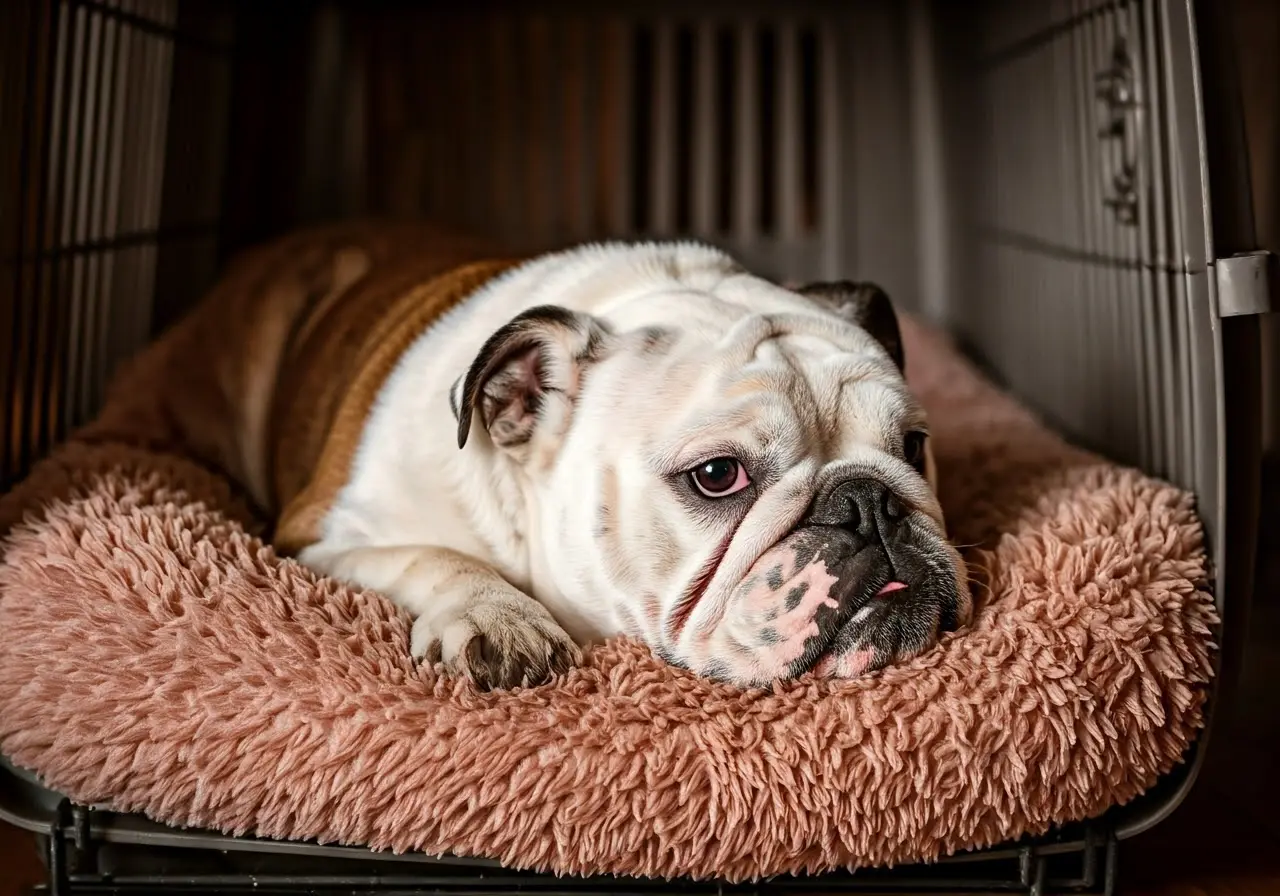English Bulldogs are known for their unique personality traits and lovable nature. While they can be a bit stubborn, they have a strong inclination towards comfort and security. In this blog, we will explore why every English Bulldog adores a cozy crate, delving into the benefits it provides for both the dogs and their owners.
Understanding the English Bulldog’s Temperament
English Bulldogs are known for their gentle disposition and affection towards their family members. Their temperament makes them inclined towards environments that offer warmth and safety. Understanding these traits can help in providing spaces that address their emotional needs. Their distinct stoic appearance might suggest they are tough and resilient, but the truth is these bulldogs cherish comfortable and secure surroundings. When they aren’t waddling around, they seek out cozy nooks to curl up in, making a crate a perfect choice for relaxation. This preference for a snug, protected area stems from their desire to establish a sense of security—a place that feels entirely theirs. Thus, adopting a crate can significantly contribute to their overall happiness.
Moreover, English Bulldogs often struggle with anxiety if left in wide open or unfamiliar spaces. This breeds’ preference for defined, secure areas makes crate training a fantastic choice for addressing this issue. Dogs, much like humans, find reassurance in having a familiar environment; it aids in reducing anxiety and fosters a calmer demeanor. A crate acts as a personal oasis from the bustling activity of household life, a place where they can escape noise and hubbub. By simulating a den—an instinctual place of refuge—crates fulfill their natural need for safety and tranquility. Therefore, understanding your English Bulldog’s inclination towards protective spaces can ensure you provide them with a home environment that substantially enriches their life.
The Benefits of Crate Training
Crate training offers various benefits including helping to manage your Bulldog’s behavior, providing them with a sense of security, and assisting in house training efforts. A crate acts as a den-like space where they can retreat to relax, making it an essential tool for pet owners. By using a designated area for sleep and rest, dogs learn to avoid soiling their sanctuary, enhancing their natural instincts for cleanliness. This makes the process of housebreaking your English Bulldog easier and often faster—a boon for many dog owners who struggle with this aspect of training. Furthermore, confinement in a cozy crate can prevent destructive behavior when you’re unable to supervise them, such as when you’re out running errands or working at your desk.
In addition to behavior management, crates are pivotal for travel safety. Whether by car, airplane, or train, a crate becomes an integral accessory, ensuring that your Bulldog is secure and comfortable during your journeys. They provide reassurance and protection, reducing travel-induced stress both for your pet and you as an owner. Plus, crates help prevent possible injuries caused by sudden movements. The habitual use of a crate at home thus makes it an excellent tool during veterinary visits or extended stays at boarding facilities, as the familiar scent and structure mitigate anxiety during these disruptions to routine. Altogether, the benefits of crate training extend beyond mere behavior modification—they ensure a harmonious lifestyle both for you and your beloved pet.
Choosing the Right Crate for Your Bulldog
Selecting the right crate involves considering the size, material, and comfort features suitable for an English Bulldog. Ensuring that it’s snug but not too tight allows your pet to feel cozy while being comfortable enough to move around with ease. Whether you opt for a wire crate or a softer fabric construction, the choice heavily depends on your dog’s disposition and specific needs. Wire crates offer durability and ventilation, great for a Bulldog who might feel easily hot. Conversely, fabric and plastic crates offer a more enclosed environment, akin to their natural dens, which might suit Bulldogs prone to anxiety in more challenging environments. Therefore, your choice should reflect the specific characteristics of your Bulldog’s behavior and physical requirements.
To ensure maximum comfort, add soft bedding and consider using a blanket this breed can nelly up under. English Bulldogs are known for their love of plush surfaces, so including these creature comforts will make their crate an inviting retreat. Plus, incorporating this option helps keep your Bulldog from finding alternative, potentially unsafe, resting places throughout the house. Look for a crate that is simple to clean and maintain—given the breed’s propensity for slobbering or occasional accidents. Additionally, make sure that the crate location is optimal; placing it in a quiet corner may enhance your dog’s relaxation. It’s essential to avoid areas with harsh lighting or noise, which could disturb their rest and lead to discomfort.
Making the Crate a Welcoming Space
Transforming the crate into a welcoming haven involves adding soft bedding, favorite toys, and perhaps a blanket carrying your scent. This will encourage your Bulldog to associate the crate with positivity and relaxation. Adding a few favorite safe chew toys can also provide mental stimulation and entertainment, making their time in the crate engaging and enjoyable. These elements contributed to a more soothing environment, which your Bulldog will be naturally drawn to, further developing a strong positive association with their crate. Encouraging regular, short periods in the crate throughout the day—beginning with door-open situations—can further cultivate your dog’s affection for their personal space.
Integrating a consistent routine significantly aids in making the crate an appealing spot. By establishing specific crate times for sleeping, resting, or simply unwinding, your Bulldog will learn to anticipate and welcome these interactions willingly. Routine incentives, such as treats, reinforce positive feelings about entering the crate, and over time, your dog will likely head there unsolicited, particularly during moments of stress or fatigue. Remember that every aspect of the crate experience should aim to eliminate potential negatives, providing instead a safe space where love and care resonate with your Bulldog’s instincts. A few minor adjustments can ensure that the crate isn’t just an accessory but an integral, beloved part of their everyday life.
Common Misconceptions about Crating
Many people mistakenly believe that crating is inhumane. However, when done correctly, crating aligns with your dog’s natural instinct to seek den-like spaces. Addressing these misconceptions ensures that you can confidently make the best choices for your pet’s care. Critics may see crates as ‘cages,’ misunderstanding their purpose and disregarding their role in providing dogs with a structured environment. Properly used, a crate is never punitive but rather a source of solace and security. Dogs naturally retreat to enclosed areas—be it under tables or in corners—so offering them a designated space aligns with these innate behaviors. Transparency in the benefits of crating can challenge the misconception, revealing it as the positive tool it’s intended to be.
It’s important to emphasize the proper technique involved in crating. Duration and timing are crucial—prolonged confinement without breaks for activity, water, or companionship can indeed be detrimental. However, correct implementation introduces structure and consistency, creating boundaries that foster a well-adjusted pet. Observations shared by experienced trainers highlight how implementing structured crating enriches a pet’s confidence, independence, and social integration skills. Misunderstandings often arise from misuse or misinformation, thus reinforcing the necessity to educate and share successful experiences. Given thoughtful integration into daily life, a crate supplies your Bulldog with a sense of ownership and belonging often overlooked when evaluating their housing needs.
Embracing the Cozy Crate
Crate training can be a rewarding experience for both you and your English Bulldog, offering them a sanctuary where they feel safe and content. By understanding their need for security and comfort, you can ensure that their crate becomes their favorite spot at home. Remember, with love and patience, the crate will quickly become a beloved space for your furry friend.




